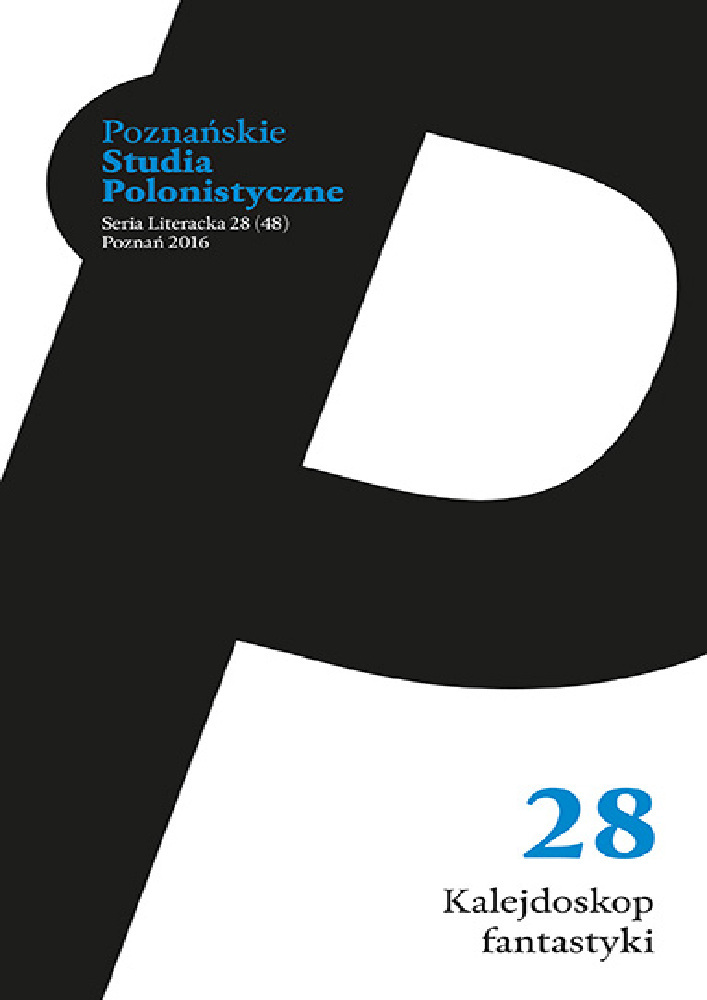Abstract
In Poland, research-related fanzines rarely include writings edited by Polish fans of science fiction, horror and fantasy. Active fans edited amateur magazines which were very important because they popularized fantastic literature and culture in Poland. The role of fantastic fanzines was not limited solely to the promotion of amateur creativity or publishing translations of foreign fiction not available on the market, but also consisted in the creation of creative bonds between writers and readers. The remnants of the activities of Polish fantastic fiction fans are about one hundred titles including “Quasar”, “Red Dwarf” and “Other Planets”. These three fanzines as effects of pure amateur work are also very similar to the professional magazines. Each of them has a different poetics and thematic dominant. They have also published stories written by famous Polish writers such as Ewa Białołęcka and Andrzej Sapkowski.References
Biały Konrad (2015), Nasz czołowy fanzin „Czerwony Karzeł”, [dostęp: 10 listopada 2015], http://gkf.org.pl/nasz-czolowy-fanzin-czerwonykarzel.
Coverdale Andy (2010), Fanzines and the Changing Identity of Football, [dostęp: 10 listopada 2015], http://phdblog.net/wp-content/uploads/2010/08/football-fanzines.pdf.
Czerwony Karzeł #5 (2015), [dostęp: 10 listopada 2015], http://gkf.org.pl/czerwony-karzel-5.
Dunin-Wąsowicz Paweł, Varga Krzysztof (1998), Parnas Bis – słownik literatury polskiej urodzonej po 1960 roku, Lampa i Iskra Boża, Warszawa.
Dunin-Wąsowicz Paweł (2002), Xerofeeria 2.0: antologia artzinów: polskich alternatywnych pism literackich 1980-2000: wersji beta, Lampa i Iskra Boża, Warszawa.
Encyklopedia fantastyki (2016), [dostęp: 9 listopada 2016], http://encyklopediafantastyki.pl.
Fatyga Barbara (2005), Dzicy z naszej ulicy. Antropologia kultury młodzieżowej, Instytut Stosowanych Nauk Społecznych, Uniwersytet Warszawski, Warszawa, [dostęp: 10 listopada 2015], http://www.ipsir.uw.edu.pl/UserFiles/File/Katedra_Socjologii_Norm/TEKSTY/BFatygaDzicy_z_naszej_ulicy.pdf.
SF Citations for OED (2015), [dostęp: 10 listopada 2015], http://www.jessesword.com/sf/view/186.
Gepfert Ewa (2015), Co tam nowego w fanzinach, [dostęp: 10 listopada 2015], http://www.skf.from.hell.pl/monthly/iss122/fanzin1.htm.
Głowacki Bartosz (2010), Prasa trzeciego obiegu w okresie przełomu, [dostęp: 10 listopada 2015], http://www.kmt.uksw.edu.pl/media/pdf/kmt3_glowacki.pdf.
Gołębiowska Anna Tess (2012), Inne Planety w Nowej Galaktyce, [dostęp: 10 listopada 2015], http://drugaera.org/inne-planety-w-nowej-galaktyce.
Kajtoch Wojciech (2001), Co to jest zin?, [dostęp: 10 listopada 2015], http://zinelibrary.pl/index.php?option=com_content&view=article&id=118:wojciech-kajtoch-czym-jest-zin&catid=11:ozinach&Itemid=3.
Kajtoch Wojciech (2006), Fanzin [hasło], w: Słownik terminologii medialnej, red. Walery Pisarek, TAiWPN, Universitas, Kraków, s. 250.
Kajtoch Wojciech (2011), Prasa studencka lat 80. XX w. – agonia czy przemiana, w: Kultura studencka. Zjawisko – twórcy – instytucje, red. Edward Chudziński, Fundacja STU, Kraków, s. 291-305.
Kochanowicz Rafał (2015), Od „Orbity” do „Pyrkonu”. Tradycje poznańskiej fantastyki, [manuskrypt złożony do druku].
„Kwazar” [hasło] (2015), [dostęp: 10 listopada 2015], http://encyklopediafantastyki.pl/index.php/Kwazar.
Louis Russell Chauvenet (2015), [dostęp: 10 listopada 2015], http://zinewiki.com/Louis_Russell_Chauvenet.
Nagroda Fantoma (2015), [dostęp: 10 listopada 2015], http://lezard.republika.pl/Fantom.html.
Pęczak Mirosław (1992), Mały słownik subkultur młodzieżowych, Semper, Warszawa.
Siuda Piotr (2012), Kultury prosumpcji. O niemożności powstania globalnych i ponadpaństwowych społeczności fanów, Instytut Dziennikarstwa Uniwersytetu Warszawskiego, Warszawa, [dostęp: 10 listopada 2015], http://www.depot.ceon.pl/bitstream/handle/123456789/1124/piotr_siuda_kultury_prosumpcji.pdf?sequence=1.
Smuszkiewicz Antoni (2012), Problemy periodyzacji współczesnej fantastyki, w: Fantastyka w obliczy przemian, red. Rafał Kochanowicz, Dorota Mrozek, Beata Stefaniak, Wydawnictwo PTPN, Poznań, s. 11-25.
Szyda Wojciech (1998), Prowokacje kontrolowane, „Inne Planety”, nr 1, s. 20-21, [dostęp: 10 listopada 2015], http://inneplanety.pl/wp-content/uploads/2013/04/planety1.pdf.
Wągrowski R. Konrad (2001), Fantastyczne fanziny, „Esensja”, s. 66, [dostęp: 10 listopada 2015], http://esensja.pl/varia/publicystyka/tekst.html?id=19380.
Wertham Fredric (1973), The World of Fanzines. A special form of communication, Southern Illinois University Press.
Wójcik Rafał (2011), O pewnej nieobecności. Fanziny komiksowe w polskich bibliotekach, [dostęp: 10 listopada 2015], https://repozytorium.amu.edu.pl/bitstream/10593/6223/1/O%20pewnej%20nieobecnosci.Fanziny%20komiksowe%20w%20polskich%20bibliotekach.pdf.
Wójcik Andrzej (1982), Przedmowa, w: Spotkanie w przestworzach. Antologia młodych, t. 1, KAW, Warszawa, s. 5-12.
License
Authors
Authors of texts accepted for publication in „Poznańskie Studia Polonistyczne. Seria Literacka” are required to complete, sign and return to the editor's office the Agreement for granting a royalty-free license to works with a commitment to grant a CC sub-license.
Under the agreement, the authors of texts published in „Poznańskie Studia Polonistyczne. Seria Literacka” grant the Adam Mickiewicz University in Poznań a non-exclusive, royalty-free license and authorize the use of Attribution-NoDerivatives 4.0 International (CC BY-ND 4.0)Creative Commons sub-license.
The authors retain the right to continue the free disposal of the work.
Users
Interested Internet users are entitled to use works published in „Poznańskie Studia Polonistyczne. Seria Literacka” since 2016, for non-commercial purposes only, under the following conditions:
- attribution - obligation to provide, together with the distributed work, information about the authorship, title, source (link to the original work, DOI) and the license itself.
- no derivatives - the work must be preserved in its original form, without the author's consent it is not possible to distribute the modified work, such as translations, publications, etc.
Copyrights are reserved for all texts published before 2016.
Miscellaneous
Adam Mickiewicz University in Poznań retains the right to magazines as a whole (layout, graphic form, title, cover design, logo etc.).
